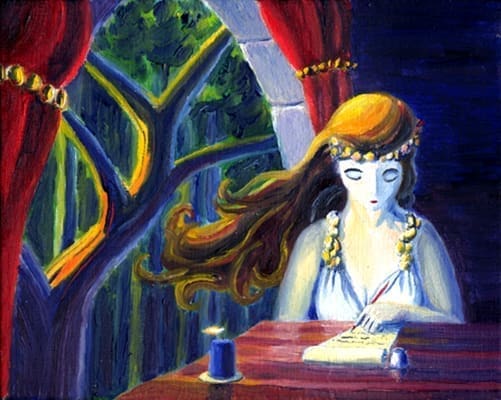
Confessions of a Catholic writer
By LORRAINE V. MURRAY, Commentary | Published September 6, 2017
The little boy in the pew ahead of me is building a house out of hymnals. He works industriously throughout Mass with a studious expression on his face.
Meanwhile, I’m trying not to be distracted, while also tucking away this delicious slice of life for future use.
Many people wonder how a writer’s mind works—and this little scenario reveals the answer. We’re born observers, collecting details like lovely shells on the beach. We tend to be introverts, which is a good thing, since writing demands long stretches of peace and solitude.
It’s not that we’re antisocial, but time has to be devoted each day to writing. As for me, I’m blessed with friends who accept that sometimes I can’t join them for lunch because a deadline is nipping at my heels.
How does someone become a writer? There’s a mystery there, just like with musicians and artists. Our talents are gifts from God and must be nurtured. I don’t consciously recall sitting down one day and declaring, “I’m going to be a writer.”
In fact, I yearned to be like the athletic kids—but I was a chubby child who dreaded “dressing out” for physical education class. Because I was naturally clumsy, I never shined at sports, and instead found solace in reading.
As for actually putting pen to paper, I started at age 9, when I received my first diary, which came with its own lock and key. On the first page, I warned potential readers to keep out—and on page two, added, “Feeling guilty?”
In high school, my journal helped me navigate the emotional agonies and ecstasies of teenage life. If I had a crush on a boy, rather than confiding in a friend, I poured my heart out in the diary.
My mother was an avid reader, and she celebrated my efforts to write. She confided she’d been hopeless at physical education, just like me. She was happy when I shared my dream of becoming a writer when I grew up, and when my first poem was published in the high school newspaper, she lovingly preserved a copy in plastic.
Unfortunately, majoring in English in college dashed my dreams of becoming a writer. You see, I became proficient at analyzing other authors’ works instead of producing my own. Little by little, I lost my faith in Catholicism, and embraced atheism and radical feminism for years. After college, I taught English and philosophy, and had little time to write.
The longing to write, however, didn’t go away. After getting married, I began penning features for a small Atlanta newspaper. Little did I realize it then, but God was calling me back to him through topics that popped into my mind “out of the blue.”
For example, I wrote about the cloistered nuns at the Monastery of the Visitation, which entailed visiting their quiet enclave in Snellville. I was enchanted with their stories of why they traded secular lives for sacred ones, especially because they seemed so happy.
Another topic that intrigued me was exploring definitions of sin. To write this story, I interviewed a Protestant pastor, a Jewish rabbi and a Catholic priest. Talking with a priest after so many years as a fallen-away Catholic piqued my interest, especially because he was intelligent and eloquent.
Writing became part of my journey back to God, which officially occurred in my 40s. After returning to the Catholic Church, I became a religion columnist with the Atlanta Journal-Constitution and The Georgia Bulletin—and also wrote a book about my spiritual odyssey with seven more books to follow.
I still process emotions through my writing and am grateful I can share my joys and sorrows with my readers. Their notes of encouragement after my husband’s death meant the world to me. When I sit down to write, I always pray that I may do God’s will. And when I see a little boy building hymnal houses, I thank God for sending me moments of inspiration.
Artwork (“Ghost,” oil painting) by Jef Murray. You may contact Lorraine at lorrainevmurray@yahoo.com.